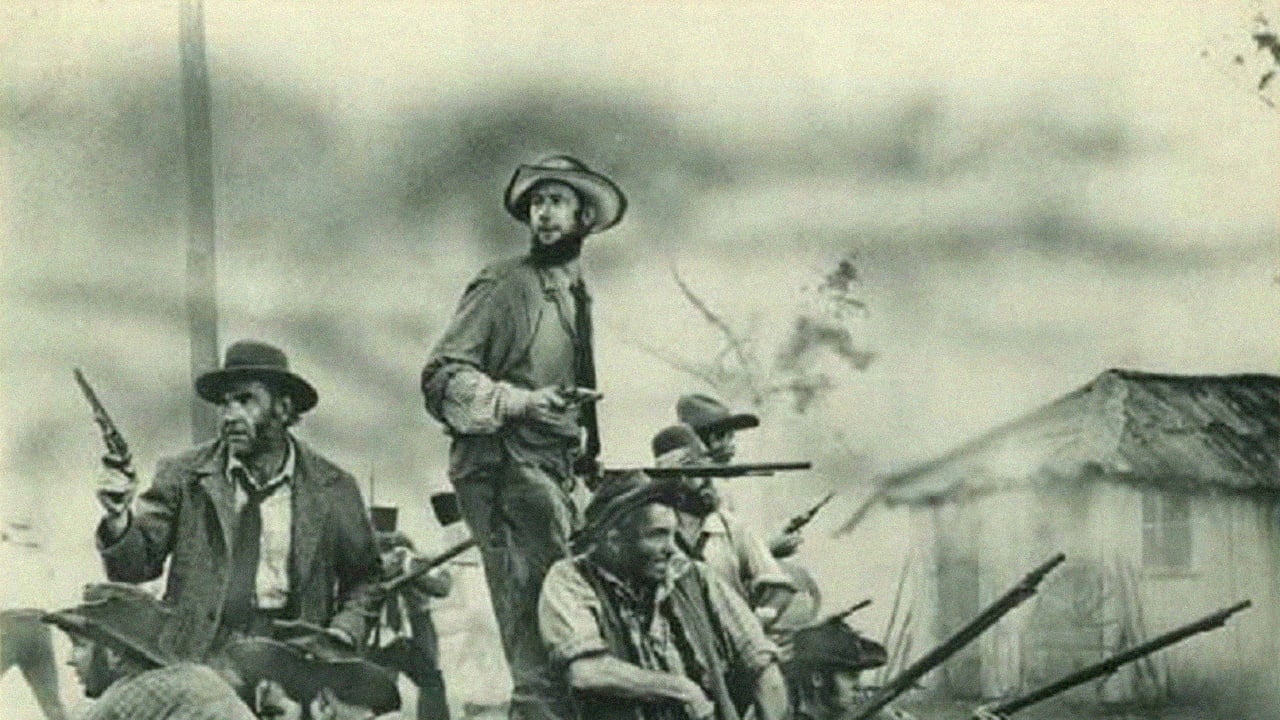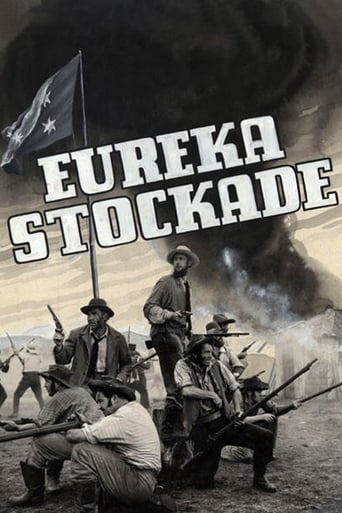

Back in a time where Historical subjects of Australian cinema were popular. "Eureka Stockade" is one of these extremely rare and underrated films that defined Australia's colonial past in cinema.Its also one of only three or four films made or based on the story of the Eureka Rebellion. Just as much as Australia is divided on what they think of Ned Kelly so too can the same be said for the Eureka Rebellion. As the narrator puts its: "Humanity has always fought for their freedom, England had her Magna Carta, France her Revolution, America her Declaration of Independence and Australia; Eureka Stockade"These events occurred back in 1854; Gold was discovered in the town of Ballarat and had brought thousands of people from all around the world to seek their fortune. What was at stake for the diggers were the mining licenses enforced by the gold commission under government orders; this lead to an outbreak in which the diggers united under the flag of the southern cross and spoke their oath to fight for their rights and liberty.There's no mention of political turmoil that historians say were partly the reason why many foreigners came to Australia at the time of the Gold Rush in the 1850s. However many names associated with Eureka Stockade can be found here(look up a history book on the subject and you'll find out more about these people); Significant figures like miners; Peter Lalor, Raffaello Carboni, Fredrick Vern, Thomas Kennedy, Gold Comissioner Robert Rede, Hotel Owner James Bently and Governor Hotham. The film explores these characters to great lengths that viewers will get to know throughout the film. The actors play the characters in their own significant roles in the story.Chips Rafferty at the time was one of Australias most famous actors, he collaborated with the Director again here for the lead role after the huge success of their previous film "The Overlanders" which I haven't seen.The Production of the film looks grand but not outstanding. It moves at a steady pace with good editing. The Soundtrack makes this film sound like its a genuine classic. Although the overall feel doesn't inspire great lengths and you'd feel more could have been done to keep people's interest in the story and how politically involving or compelling it really was. Their isn't too much to fussed about historical accuracy here, its pretty much an early attempt at telling this story and what was the case. There's a lot more I could touch up on, but I won't go into any more further detail.Some good things to say; Its interesting how the cast and crew did it back then, I quite liked it. It should give people a brief intro on the subject of the Erueka Stockade and recommended to see how it plays out.
... View More** Warning: Contains Some Spoilers ** EUREKA STOCKADE is one of the few antipodean 'Westerns' made by Ealing Studios in Australia during the mid to late forties.Peter Lalor, a recent Irish emigre to Australia, is attracted to the Victoria Goldfields of 1854 and comes to identify with the hopes and aspirations of the diggers. He is equally appalled at the apparent misgovernance and corruption of police and judicial authorities on the diggings and is particularly incensed at the exploitive prices of a mining licenses ("we are men, not serfs"). Reacting to such grievances, he helps form the Ballarat Reform League with the intention of opening up dialogue between the miners and the newly appointed Governor Hotham.Lalor is reluctant to lead anyone but is thrust popularly into such a position by the diggers themselves. The movie moves along at a nice pace and there is some nice photography. At the end of movie, it was pleasing to see some effective direct cutting between the Court trial scene and the amputation of Lalor's arm. Chips Raffetry is mis-cast as Lalor, however. Although he is a great actor, he was no leading man and the most valuable contributions he would make would be as a supporting characters displaying his usual laconical Australian wit. Raffetry's Irish accent is quite bare and he plays Lalor very softly - and supposedly reflectively - with a ludicrously fake beard.Does the film make light of the historic contradictions of Lalor's personality? Watt's Lalor proclaims his overwhelming desire for citizenship and justice against the administration of His Majesty's law, yet in real-life the Lalor later elected to parliament became a bulwark of Victorian conservatism and property holding. For while he later became a Statesmen of Victoria, he was not perpetually emancipating the downtrodden and oppressed as his leadership in 1854 would seem to suggest.There are some brief scenes in the movie where Lalor is painted as a sage like hero, not an inciter or rebel rouser but simply translating the basic hopes of the diggers to the authorities. Watt paints his Lalor as aloof and separate from the miners (we rarely see him involved in any mining of his own), yet an elusive noble hero. EUREKA STOCKADE merely confirms the story of the Lalor we know in myth and doesn't add any dimensions or depth to the figure unduly and perhaps undeservingly preeminent in colonial folklore. The movie is quite lyrical however and is certainly an enjoyable watch.In the end, concessions are granted to the miners and free settlers of the 'new' colony, most notably the extension of self-government in less than a year after the events depicted in the movie. The insurrection at the stockade is generally characterized as one of the few substantial rebellious uprising in Australia's short history and would later become subsumed in the rhetoric of Republican movement. In the immediate years following Eureka, the whole affair was come to be seen as manifestly un-British and decidingly embarrassing; an unfortunate incident led by ungrateful colonists against a more than generous motherland.
... View MoreDirector Watt, after the brilliant The Overlanders in 1946, may have even outdone that here, with a spectacular account of the infamous Eureka Stockade, and, more importantly, the events leading up to it. Rafferty is fantastic in the lead role as reluctant hero Lalor in the film which, considering the rather hefty restrictions placed on films in those days, is as close to a no-holds-barred examination of the events. Like The Overlanders, it's as entertaining as it is educational, and highly recommended for all Australians. 8/10.
... View More